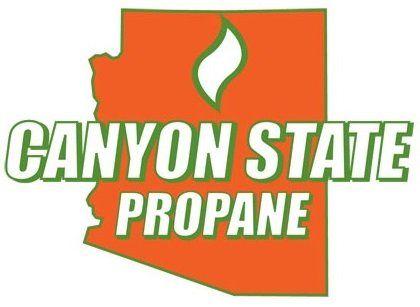Canyon State Propane FAQ
Learn More About Canyon State Propane
Have a propane-related question? Canyon State Propane has the answer. Check out these frequently asked questions and give us a call today for more information!
-
What is the current price of propane?
The price of propane fluctuates, especially with the seasons. It's best to give our team a call for an accurate and up-to-date price.
-
How soon can Canyon State Propane set me up with propane?
According to the Energy Education Program, about 830,000 U.S. farms rely on propane. This is why we always strive for same-day or next-day propane setup. However, we ask that you please contact us for the current scheduling.
-
How do I tell if I have a propane leak?
Propane has a pungent smell almost like rotten eggs. If you smell this, please contact us immediately and vacate the location.
-
Can you do tank repairs if I’m not currently your customer?
Yes, we can. However, it's always best to contact your current propane provider first.
-
What should I do if I smell gas?
If you smell gas, immediately turn off appliances, extinguish any open flames or smoking materials, and get out of the house immediately. Call Canyon State Propane at (602) 457-6223. If it is an emergency situation, call 911.
-
What is a leak test?
A leak test is used to indicate any leaks within the propane piping system due to an interruption of service or an “out of gas” event. They are meant to test the integrity of the system plumbing joints and the seal of the pipe joint compound. Bad joints mean there's space for gas to escape, which is both a safety hazard and a waste of gas. It's required by law to have a leak test done every six months.
-
Do I need a leak test if I run out of gas?
Yes, if your propane tank is out of gas, a leak test is required by law. Being out of gas is considered an “interruption of service.” If you are out of gas and it's not a result of a failure on our part, we will have to charge a fee for performing a leak test.
-
What is propane?
Propane is a hydrocarbon (C3H8) and is sometimes referred to as liquefied petroleum gas, LP-gas, or LPG. Propane is produced from both natural gas processing and crude oil refining, in roughly equal amounts from each source. Most propane used in the United States is produced domestically, however, some is imported from overseas. It is nontoxic, colorless, and virtually odorless. As with natural gas, an identifying odor is added so the gas can be readily detected.
-
Is propane dangerous to the environment?
No. Propane is an approved, clean fuel listed in the 1990 Clean Air Act and the Energy Policy Act of 1992. Propane is one of the cleanest burning of all fossil fuels. Tests conducted by the U.S. Environmental Protection Agency show that propane-fueled vehicles produce 30% to 90% less carbon monoxide and about 50% fewer toxins than other smog-producing emissions like gasoline engines. Propane is also nontoxic, so it’s not harmful to soil or water.

Share On: